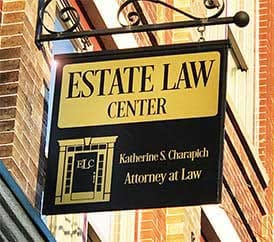Wills FAQs
What does it matter? If I don’t have a will, all of my assets will transfer to my spouse automatically, right? Estate Law Center | Wills | FAQ #125
Not necessarily. An example of where assumptions lead to uniformed and unplanned consequences is, if you die without a will in place and you have children outside of your current marriage unit, and there is no trust, joint owner with rights of survivorship, or a payable on death to turn to for directive, then your spouse may be in a position of only being able to take one-third of your estate per the laws of descent and distribution in the Code of Virginia.
My spouse has passed, I don’t own any real property, and my bank account and wealth management account are jointly owned with my firstborn child, so why would I need a will? Estate Law Center | Wills | FAQ #126
If you inherit money, and pass away prior to placing that money into your jointly owned account, and you don’t have a will, that money will pass by the laws of descent and distribution set forth in the Code of Virginia. It is possible that all of your children would then take an equal share of that inheritance.
I am concerned that if I leave assets to my grandchild who is eligible for government benefits, that he will be precluded from eligibility. Estate Law Center | Wills | FAQ #127
A grandparent (or parent) may establish a third-party special needs trust for the grandchild, and fund the special needs trust prior to or upon the death of the grandparent. The grandparent may also create the third-party special needs trust for the grandchild upon the death of the grandparent through language set forth in his will or his revocable trust.
I worked hard for every dime I have, and I just don’t want to leave any portion of my estate to my child. Is that okay? Estate Law Center | Wills | FAQ #128
The assets in your estate are yours to do with what you want, with the exception of a spouse. Using carefully drafted language, you can affect the disinheritance of a child. Regarding a spouse, but for a pre or post nuptial agreement being in place, the Commonwealth of Virginia does not want a spouse to be precluded from a share of a decedent spouse’s estate.
Who will take care of my children if I die tomorrow? Estate Law Center | Wills | FAQ #129
This is a matter that all parents with minor children should address in their wills. Do not leave this sensitive and very important subject to chance, or to litigation. Including guardianship language in your will that directs who shall become guardian of your minor children upon your death, is one of the most important directives to include in your will. Care of your minor children is a very motivating factor for having a well, thought out estate plan in place.
Should I make both of my children co-executors? Estate Law Center | Wills | FAQ #130
Many individuals want to name their children as an executor in their will. Consider naming one as primary, and then having the other’s named as successor executors.
May I leave a specific amount of money to a friend? Estate Law Center | Wills | FAQ #131
Yes, you can identify a specific amount of money you would like to leave to a friend, though there is also protective language that should be considered and included.
What if I want to leave a piece of heirloom jewelry to a certain person? Estate Law Center | Wills | FAQ #132
You may leave tangible personal property to a specific person in your will, as well as a “living list” referenced in your will. This provides an Executor with a means to change his mind should he want to give an item of tangible personal property to a different person, or if he acquires a new item of tangible personal property and decides someone has done something nice and he would like to leave a gift of remembrance as a thank you.
Can I set money aside for my pets? Estate Law Center | Wills | FAQ #133
In addition to including language identifying who will become the guardian of your pets, you can set money aside in a pet trust for your pets. A pet trust can be affected through a testamentary trust established in your will, or through language included in your revocable trust.
